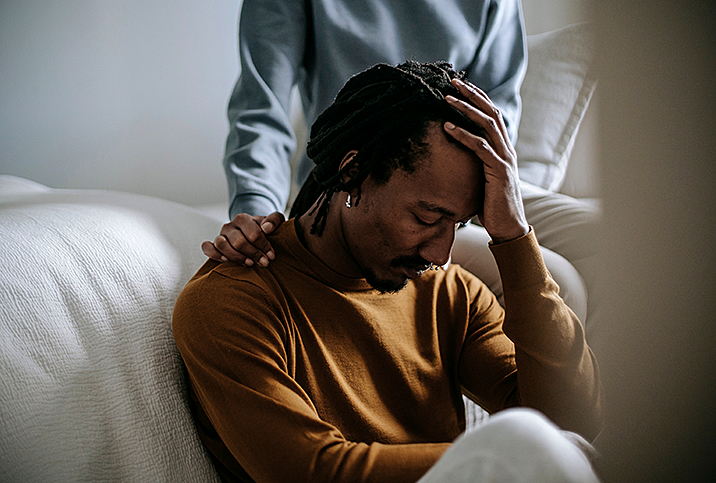How to Overcome ED Linked to Performance Anxiety

If you find yourself battling a bout of stage fright as things turn toward the bedroom, you’re not alone. Sexual performance anxiety affects between 9 percent and 25 percent of adult men, according to a 2020 Sexual Medicine Review literature summary, and can result in premature ejaculation and "psychogenic" ED—poor performance based on mental health issues—among other conditions.
Performance anxiety can create havoc in your sex life, but fortunately, there are ways to better understand and eventually treat the condition.
For a start, you need to know why it’s happening. Performance anxiety tends to occur when you have "an excessive need to … satisfy the partner in a sexual interaction," said Carolina Pataky, Ph.D., a certified sex therapist, who added that problems arise when "the focus is on performance rather than on connection and pleasure."
Sean Stewart gets candid about his experience with performance anxiety in the bedroom. Watch the full interview here.
Pataky said it’s often difficult to diagnose the problem because, in addition to issues couples face as a pair, pre-existing mental health issues such as generalized anxiety disorder and PTSD can compound performance anxiety. These conditions make it much more difficult for men to be comfortable within their own bodies, amplifying the communication issues that lead to a lack of sexual confidence.
How life events can trigger anxiety-related ED
Anxiety-related ED typically reveals itself at the worst times, such as when we’re significantly stressed at work or going through very difficult life events, including the death of a loved one or job loss. Stress can trigger a tightening of a variety of bodily functions, such as blood flow, endorphin release and emotional function, and can lead to lower performance of the circulatory, nervous and endocrine systems, according to a 2015 American Journal of Physiology literature review comparing animal reactions to similar, potential human reactions.
Overcoming performance anxiety begins with self-connection
Pataky said she would sometimes help patients embrace short-term mindfulness techniques to help ease anxiety’s grip. "It helps the client reconnect with themselves and tune into their body," she said. To help a patient relax and surrender to the sensations in their body, Pataky includes breathing exercises in her sessions that help activate the parasympathetic nervous system, which controls the body when it's at rest.
Communication is also crucial for overcoming performance anxiety. Whether it’s learning to talk about a fantasy or creating a more general sense of playfulness, it can be liberating for couples to talk about their likes and dislikes without judgment or expectations. Pataky said when couples can share their inner emotional and erotic worlds, they feel safer to open up and explore their sexual boundaries.
Deeper issues require deeper work
More long-term mental health issues could be rooted in anything from childhood trauma to past abuse, and these situations require a deep dive into your beliefs about sex and relationships. "As we know, one of the biggest sexual organs is our brain," Pataky noted, adding that trauma, even repressed or hidden, can cause lasting changes to the brain and offset the capacity for pleasure, engagement and self-control.
Given these factors, it’s easy to understand why so many couples encounter performance anxiety at one point or another. "[We] have difficulty staying present within our bodies," Pataky said, "[so] it becomes difficult to have the ability to surrender and let go in pursuit of body, mind and soul."
The good news is that performance anxiety is treatable. While it requires tough work to discover the root cause, with some professional help, you could find yourself calmer—and performing much better.


















